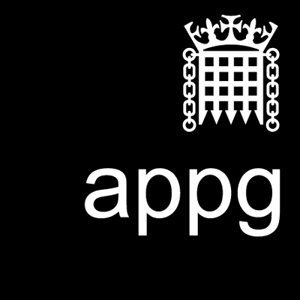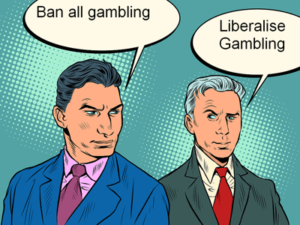UKGC Comes Under Fire Again From MPs But Is It Fair?
 The United Kingdom Gambling Commission has come under fire again from members of parliament, with an All-Party Parliamentary Group writing a report criticising the body for trying to reduce gambling addiction. The APPG’s findings haven’t been well received, either by the Gambling Commission or by gambling reform campaigners. It is a topic that is not without controversy, with the Vice-Chair of the group, Conor McGinn, resigning from the group over the report. He said that did not want to be associated with it, after members of the group were revealed to have ties to the gambling industry.
The United Kingdom Gambling Commission has come under fire again from members of parliament, with an All-Party Parliamentary Group writing a report criticising the body for trying to reduce gambling addiction. The APPG’s findings haven’t been well received, either by the Gambling Commission or by gambling reform campaigners. It is a topic that is not without controversy, with the Vice-Chair of the group, Conor McGinn, resigning from the group over the report. He said that did not want to be associated with it, after members of the group were revealed to have ties to the gambling industry.
The All-Party Parliamentary Group launched an investigation into the UKGC last year, refusing to reveal its findings. The Guardian newspaper, however, was able to obtain a copy of parts of the report, which appears to attack the Gambling Commission over its attempts to reduce addiction to gambling. The Commission is, according to a draft of the report, ‘in urgent need of change’, given that it risks ‘the destruction of one of the world’s best gambling industry’s’. Unsurprisingly, this take has itself been criticised by those that are hoping to see more curbs introduced to the world of betting.
What The Report Says
 An Investigation into the Competence and Effectiveness of the Gambling Commission by the All-Party Parliamentary Group on Betting and Gaming was critical of the UKGC, stating that it had ‘gone rogue’ and was taking an ideological stance against the gambling industry, rather than a supportive one. In amongst the criticism was a suggestion that the Gambling Commission had ignored complaints against BetIndex and the company’s business model, including a complaint that came in from the Independent Betting Adjudication Service, in addition to ignoring a ‘go to market’ feature during its application stage.
An Investigation into the Competence and Effectiveness of the Gambling Commission by the All-Party Parliamentary Group on Betting and Gaming was critical of the UKGC, stating that it had ‘gone rogue’ and was taking an ideological stance against the gambling industry, rather than a supportive one. In amongst the criticism was a suggestion that the Gambling Commission had ignored complaints against BetIndex and the company’s business model, including a complaint that came in from the Independent Betting Adjudication Service, in addition to ignoring a ‘go to market’ feature during its application stage.
Scott Benton, the Co-Chair of the APPG, said,
“As Co-Chair of the All Party Betting and Gaming Group, I am truly shocked to reveal so much evidence of bad practice by the Gambling Commission over the years. We have been hearing stories for years, but to see it in black and white is pretty stark. To think that members of our gambling industry, one of the most reputable in the world, who pay the Commission’s wages, have had to suffer such poor service from their regulator is of the utmost concern. Especially as it acts like it is an anti-gambling group, whose sole purpose is to destroy the industry.”
Benton’s final words are the ones that are most concerning for the UKGC and for critics of the gambling industry, given that they appear to suggest that the Gambling Commission should be acting in support of the gambling industry at all times. The report’s summary did at least offer some solace, stating,
“We are obviously not against the concept but believe that the Commission has neither the tools or expertise to attempt such a thing, which has never been attempted elsewhere, via regulatory methods alone. We believe that the Commission is on an ideological mission that will undoubtedly lead to an explosion in the black market.”
Is The APPG Truly Independent?
 The obvious question to ask is about whether or not the All-Party Parliamentary Group is truly an independent one. Part of the reason for Conor McGinn’s decision to resign his post on the group was that members of it had been guilt of accepting freebies from gambling industry representatives. The aforementioned Scott Benton, for example, was given tickets to England’s European Championship semi-final against Denmark by Entain, the parent company of Ladbrokes, which were worth more than £3,000.
The obvious question to ask is about whether or not the All-Party Parliamentary Group is truly an independent one. Part of the reason for Conor McGinn’s decision to resign his post on the group was that members of it had been guilt of accepting freebies from gambling industry representatives. The aforementioned Scott Benton, for example, was given tickets to England’s European Championship semi-final against Denmark by Entain, the parent company of Ladbrokes, which were worth more than £3,000.
Just hours earlier, Benton had spoken in parliament about the need to avoid an ‘anti-gambling ideology’ in the review of the 2005 Gambling Act. He also suggested that casinos should be allowed more slot machines and that the Gambling Commission’s plans for an increase in affordability checks were ‘concerning’, yet in the weeks preceding his statement he had attended racing at Ascot courtesy of the Betting & Gaming Council. Between August 2020 and November 2021, MPs had taken nearly £225,000 from gambling industry representatives in both wages and freebies.
Whilst 19 of the 28 MPs who had been treated to hospitality by the gambling industry were from the Conservative Party, About MPs weren’t all clean of such accusations. John Spellar said that there was a need to continue making the UK an ‘attractive’ casino destination, having recently attended the match between England and Germany as a guest of Paddy Power’s owner, Flutter Entertainment. He was also in line to attend a game of cricket at Lord’s as a guest of the BGC, which is a body that represents casino companies.
There is no question that politicians in the APPG have been bombarded with a ‘charm offensive’ by the gambling industry in the run-up to the release of the white paper that many think will introduce curbs to the profitability of online casinos and bookmakers. Not that all that many people will be surprised at members of parliament being hypocrites, of course. In 2010, Philip Davies, the Tory MP for Shipley, declared that firefighters needed to ‘live in the real world’ when people were ‘grateful to hang on to their one job’, stated because they were concerned about shift patterns causing them to lose their second jobs.
In 2020, Davies received nearly £50,000 from Entain, the owner of betting companies like Ladbrokes and Coral, in order to advise them about customer service matter and safer gambling issues. When he was asked about this second job, he declared that it was ‘a matter for me’, changing his tune on what he’d said about the firefighters. As well as being paid a wage by Ladbrokes, Davies was also given hospitality experiences that were worth more than £8,500 from not just Entain, but also the BGC, Gamesys and Flutter Entertainment.
The UKGC As Whipping Boys?

Whilst most people in the gambling industry would readily admit that the Gambling Commission has its faults, it is difficult to argue against the idea that it is something of a whipping boy for criticism from members of parliament that are always happy to pass the buck themselves. In reality, the Gambling Commission has long been underfunded, which has reduced its ability to properly regulate one of the biggest money-making industries in the United Kingdom. It is, though, a convenient scapegoat for the members of parliament that have been responsible for its underfunding.
In August of 2020, for example, the Gambling Commission was forced to press ahead with job cuts in order to save £1 million, seeing its already relatively small workforce cut. The UKGC works with an annual operating budget of about £19 million, which is obviously small potatoes when compared to the £14 billion a year taken in by gambling companies. The MPs that were, in essence, forcing the cuts were quick to criticise the UKGC for the decision it had taken. The Public Account Committee Chair, Meg Hillier, said the following on the matter:
“It is for the Gambling Commission to decide how to up its game as radically as is required but, given the huge gaps in its understanding of harms from the gambling industry in the UK and the tortoise-like progress it has made on adapting the rules to tackle those harms, it is hard to see how cutting its staff resource is the answer.”
In other words, it is the choice of the UKGC to make cuts, but by doing so they’re risking falling further behind in the progress that it has been making. Hillier went on to say that the Commission was ‘adrift’ and that the Department for Digital, Culture, Media and Sport, which is responsible for the UKGC, needed to put specific performance targets in place and that the Commission itself then needed to ‘make a proper plan to meet them’. The Commission itself, meanwhile, said that it was making plans to ensure it was more ‘agile’.
The Two Voices Of Gambling Reform
 One of the biggest problems being faced by the Gambling Commission is the fact that there are effectively two voices when it comes to gambling reform: the one that says gambling is a dangerous pastime and should be banned in its entirety and the other that believes in the importance of a free market without regulation. Those two diametrically opposed viewpoints are fighting against one another over a body that is almost incapable of doing the job that it has been given because of a lack of funding. The UKGC is being asked to be all things to all people when that is not possible.
One of the biggest problems being faced by the Gambling Commission is the fact that there are effectively two voices when it comes to gambling reform: the one that says gambling is a dangerous pastime and should be banned in its entirety and the other that believes in the importance of a free market without regulation. Those two diametrically opposed viewpoints are fighting against one another over a body that is almost incapable of doing the job that it has been given because of a lack of funding. The UKGC is being asked to be all things to all people when that is not possible.
The MPs in the All-Party Parliamentary Group accused the regulator of a ‘bullying attitude that has caused mental harm’ for people within the industry. They called on the government to take the UKGC into ‘special measures’ whilst work is done to determine whether it should be allowed to ‘continue as it is’. This is on the back of the Gambling Commission issuing record fines to bookmakers like Betway, who were fined £11.6 million for accepting stolen money from VIP customers, some of whom were displaying signs of having a gambling addiction.
It is difficult to take such criticism seriously, however, when you consider the hospitality and other benefits handed to members of the APPG tasked with putting forward a report on the regulator. Are they being critical of it because they actually think the UKGC is underperforming in its role, or because they have ties to the gambling industry that the Gambling Commission is responsible for regulating? Aaron Bell, a Conservative MP, used to work for Bet365 and received hospitality worth nearly £7,000 in the build-up to the report’s release, for example.
On the other side of the debate, there are plenty who will be critical of the UKGC regardless of what it does because they take a hardline stance on gambling. Matt Zarb-Cousin, who is the Director of Clean Up Gambling, said,
“The growth of online gambling, and the harm associated with it, has increased exponentially under the Gambling Commission’s watch. If anything the operators should be thanking the regulator.”
In his opinion, the UKGC hasn’t gone far enough in looking to bring gambling operators in line with more stringent rules.
Zarb-Cousin went on,
“What we need is an overhaul of regulation that empowers the Gambling Commission to ensure far more prescriptive rules, more comprehensive oversight of licensees and penalties for non-compliance.”
In other words, there is no way for the UKGC to win over both sides of the argument. MPs, who have received kick-backs from the industry, feel that it should be freer to do what it wants, whilst campaigners feel that the UKGC’s job should be to more closely regulate the world of gambling in order to be able to better protect those that need protection.
What Is The Solution?
 The most obvious thing to emerge from conversations around the Gambling Commission is that, in its current form, it is not fit for purpose. There will always be some on both sides of the argument that think that a regulator should be doing more of what they want, but the reality is that at the moment the UKGC doesn’t seem to be doing much of what anyone wants. The Chief Executive of the Betting & Gaming Council, Michael Dugher, is right when he says that ‘gambling reform cannot be hijacked by extremists’ agendas’, but perhaps not in the way he thinks. There have been calls to scrap the UKGC altogether and replace it with a new body as well as keeping the UKGC along with a new gambling ombudsman.
The most obvious thing to emerge from conversations around the Gambling Commission is that, in its current form, it is not fit for purpose. There will always be some on both sides of the argument that think that a regulator should be doing more of what they want, but the reality is that at the moment the UKGC doesn’t seem to be doing much of what anyone wants. The Chief Executive of the Betting & Gaming Council, Michael Dugher, is right when he says that ‘gambling reform cannot be hijacked by extremists’ agendas’, but perhaps not in the way he thinks. There have been calls to scrap the UKGC altogether and replace it with a new body as well as keeping the UKGC along with a new gambling ombudsman.
The upcoming reform of the 2005 Gambling Act is a chance to ensure that the industry is well set for the next twenty years. If either side of the argument get to take control of the conversation then it is likely that we’ll end up with another Gambling Act that isn’t fit for purpose. Equally, if those responsible for shaping the Act are too easily influenced, it’s possible that the Act we end up with at the end of it all doesn’t really do anything that anyone wants. The only good news is that the gambling industry’s voices were ignored when the cut to maximum stakes on Fixed Odds Betting Terminals were introduced. Perhaps sense will prevail once again.



